|
|
|
Sort Order |
|
|
|
Items / Page
|
|
|
|
|
|
|
| Srl | Item |
| 1 |
ID:
127531
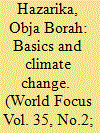

|
|
|
| 2 |
ID:
136048
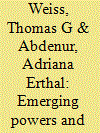

|
|
|
|
|
| Summary/Abstract |
Since the outset, in the aftermath of World War II, the United Nations development system (unds) has constituted an essential pillar of the world organisation’s activities, along with those devoted to peacekeeping, humanitarianism, human rights and justice. Adaptations notwithstanding, serious questions remain about its effectiveness and capacity to represent adequately the aspirations of ‘we, the peoples’ – the opening words of the UN Charter – particularly in the global South. Although developing countries have joined forces at different stages in the international arena – including through the Non-Aligned Movement (nam) and the Group of 77 (G77) – to increase their voices within the system, over the past decade a new twist has been added, the visibility of emerging powers. This reality not only reflects the latter’s growing role as providers of development cooperation but also their criticism of the existing architecture for global economic governance.
|
|
|
|
|
|
|
|
|
|
|
|
|
|
|
|
| 3 |
ID:
136058
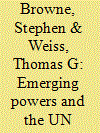

|
|
|
|
|
| Summary/Abstract |
The importance of emerging powers in the UN development system is undeniable, but their influence over the shape of the post-2015 agenda is less clear. This article examines recent survey data by the Future UN Development System (funds) Project in order to better gauge the perceptions of the problems and prospects.
|
|
|
|
|
|
|
|
|
|
|
|
|
|
|
|
| 4 |
ID:
136053
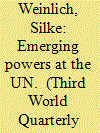

|
|
|
|
|
| Summary/Abstract |
The economic rise of China, India, South Africa, and Brazil has turned these countries into important providers of development assistance. While they seem increasingly comfortable in their bilateral relations with other developing countries, they are struggling to adapt their position within global institutions such as the United Nations. Do they turn their increased weight into a greater influence at the UN, and if not, why not? This article analyses financial contributions and political positioning at the UN in the area of development. Despite small changes, the four countries mostly insist on keeping their traditional status as recipients and ‘ordinary’ developing countries. This reservation can be explained in two ways: first, a more explicit leadership creates political and material costs that outweigh the potential benefits. Second, their shared experiences as developing countries make it hard to break ranks at the UN.
|
|
|
|
|
|
|
|
|
|
|
|
|
|
|
|
| 5 |
ID:
136051
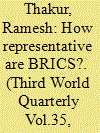

|
|
|
|
|
| Summary/Abstract |
The five countries known as brics, while not homogeneous in interests, values, and policy preferences, do have a common interest in checking US/Western power and influence through collaboration with non-Western powers. They vary considerably but all are ahead of other developing countries on population, military power, economic weight, geopolitical clout, and global reach and engagement. They are unrepresentative of the typical developing country in terms of interest, capacity, and resources, but they can represent the interests and goals of developing countries as a group on those issues for which the North–South division is salient. The diversity within brics, their differences from other developing countries, and their potential to reflect and represent the global South are explored with respect to climate change, finance, trade, aid, human rights and intervention, and development. It remains unclear whether brics can morph from a countervailing economic grouping to a powerful political alternative.
|
|
|
|
|
|
|
|
|
|
|
|
|
|
|
|
| 6 |
ID:
107932
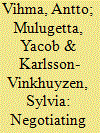

|
|
|
|
|
| Publication |
2011.
|
| Summary/Abstract |
The negotiating group of developing countries, the G77, is one of the most important institutions in global climate governance. This article analyses the cohesiveness of, and internal tension within, the G77 coalition by using the politics of climate change as the empirical window. The study examines four arenas of UN-based deliberations on climate change in the years 2007-2010; the Security Council, the Commission on Sustainable Development, the General Assembly and the United Nations Framework Convention on Climate Change (UNFCCC). We argue that these deliberations, once they reached the top of the international political agenda in 2007, and ever since, have posed deeper challenges to the G77 coalition than ever before. While developing country interests are both converging and diverging, the increasingly conflicting interests, as well as the very slowly eroding common identity, are creating increasingly unified subgroups in the G77. The G77 is highly unlikely to break up formally, but how functional it will be as a bloc in the forthcoming climate change negotiations remains an open question.
|
|
|
|
|
|
|
|
|
|
|
|
|
|
|
|
|
|
|
|
|